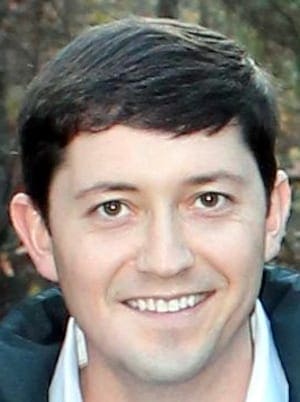Pastors do everything we can during this time of year to remind people that Christmas means that God has chosen to be present and active in our world.
This year that’s an uphill battle. Every time I open my web browser or turn on the TV, I’m reminded that God can seem awfully absent sometimes.
This season, humanity’s inhumanity toward one another – and our inability to deal with it – is on full display.
It seems like every year we mourn the gap between what Christmas promises and what we actually experience out in the real world.
And every year we claim that the gap is wider, that the world has grown more violent and more indifferent.
Here’s my theory this year, at the risk of being too simplistic; when you look at everything that’s going on, it all boils down to one thing: people are afraid.
We all crave the security of position and possession that seems just now to elude us. So we’re scared.
And when we are afraid, one of the first casualties is our civility, our willingness to acknowledge our shared lot in life.
We retreat to our own corners, to our own tribes, to our own places of safety and quickly fall into “us” versus “them” mentalities.
When we feel threatened, “we” have no problem articulating what “those people” don’t understand, what “they” aren’t willing to do, or what “they” would do if “we” let them.
Every time fear overwhelms us, “we” start to point the accusatory finger at “them.”
For the most part, I don’t believe we hate “those people” – whoever “those people” are in our particular situation. I think we’re just scared. But here’s the thing: the people we call “those people,” God calls “my people.”
On the second Sunday of Advent, Isaiah 40:1 was the text from the Hebrew Scriptures. “Comfort, comfort my people, says your God.”
In Isaiah 40:3-5, God goes on to give detailed instructions about the need to go to great lengths to make sure that everyone, all people, would see God in all God’s glory together. In other words, all people are “my people” to God.
Several hundred years later, when Christ is born, we still hadn’t quite understood this message.
So God again goes to great lengths to make sure we understand that God is for all of us together.
In a field outside of Bethlehem, the angels filled the sky, the glory of the Lord surrounded a group of shepherds, and an angel spoke a message from God saying – and I’m paraphrasing – “God is here; that’s good news for all people; don’t be afraid” (Luke 2:9-11).
And now, several thousand years later, it appears we still haven’t quite understood God’s words.
So what are Christians supposed to do this Christmas? Here’s a suggestion: We should do what Isaiah says by preparing the way of the Lord (Isaiah 40:3).
We should do what we can where we are to create favorable environments for the coming of Christ.
How?
First, we should both speak and offer comfort to God’s people who are suffering.
Second, as we approach Christmas and gather around family tables, we should rigorously refuse to use “us” and “them” language or engage in “us” and “them” conversations.
It’s dangerous and does nothing to prepare the way for the coming of Christ at Christmas.
We shouldn’t slip into that kind of language ourselves, and we should have the courage to speak a word on God’s behalf whenever we hear someone else start talking about “they” or “them” or “those people.”
We should be willing to speak up and say, “The ones you’re calling ‘those people’ God calls ‘my people.'”
When prejudice – intended or not – is met with silence or indifference, the gospel loses. When fear goes unchallenged, nobody wins.
Speaking up when someone else is speaking out of fear isn’t always easy. So if, like me, you’re hesitant to interject, let this Christmas reminder, straight from the mouth of God’s messenger, encourage you: “God is here. That’s good news for everyone. Don’t be afraid. All people are ‘my people’ to God.”
 Matt Sapp is the pastor of Heritage Baptist Fellowship in Canton, Georgia. A longer version of this article first appeared on Heritage’s blog and is used with permission. You can follow him on Twitter @MattPSapp and Heritage @HeritageCanton.
Matt Sapp is the pastor of Heritage Baptist Fellowship in Canton, Georgia. A longer version of this article first appeared on Heritage’s blog and is used with permission. You can follow him on Twitter @MattPSapp and Heritage @HeritageCanton.
Matt Sapp is pastor of Central Baptist Church in Newnan, Georgia.

